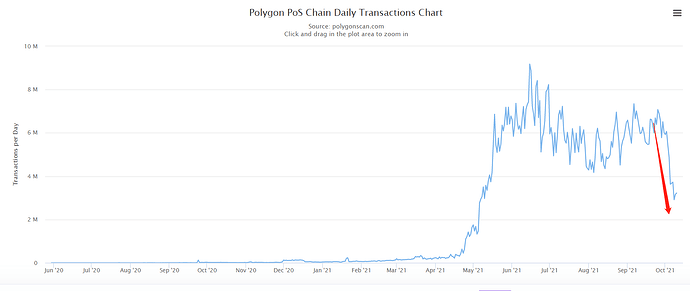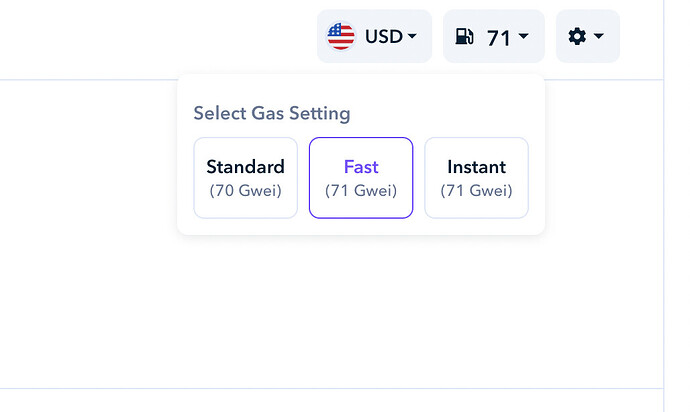Okay sorry I found the swap token for gas fee feature that you must be referring to. Thank you.
I don’t oppose the idea. It may help prevent untended or bad behaviors but then again I haven’t ran an analysis.
Some say that 30gwei is too much, but in actuality it still pennies… which is much better than most other L2’s i’ve seen…
I’m for taking actions to try to eliminate spam, I just feel this should have been a community discussion. I do like @kasperk’s response of possibly incrementally increasing it until the result of less spam transactions is achieved. Regardless it is done, and it is far below most other L2 solutions still. We just expect better communication going forward please.
There are 2 problems here:
- If you think spam txns is a problem, then it means the chain was flawed in its initial design.
Creating a super low cost chain and attracting people to use it, but not wanting to have spam txns is contradictory in itself.
- It should not be up to the chain team to judge what transactions are spam.
The current approach raises the question: if there is still a lot of spam txns after raising it to 30 gwei, does it need to be raised to more?
I think this is never ending because logically it just doesn’t make sense.
Agree on this thought, there needs to be more transparency as well
The underlying problems is the validators i think. First, the deviation of gas price in polygon is too large. Users got to accelerate many times to get the transaction confirmed. Even you guys change to 30 gwei, after i accerelate to 33gwei, it is still not get confirmed , i can see alot of transaction stucked even they give 10000,1000 gwei.The confirmation has become very slow. Solana has cheaper cost compared to polygon why less spamming?Second, as L2 solution, the TPS is not very high, i don’t see any constructive work you guys have done to improve the gas experience.
Are we throwing random number here?
How the increment was justified?
How is the team decided the x30 increment would stop tx spam? Shows us the data.
i hope there are more permenant solution than just increase the gas . would gas fee increase again to counter spam tx again?
I 100% agree with Leroy. 
Figure out a better way to reduce spam transactions.
This is a terrible design decision. The gas price should be a function of supply and demand. The network should converge on a minimum floor for the price. Pulling a random number sounds insane to me.
We’re developing against Polygon but after seeing this I’m seriously reconsidering launching anything on Matic.
We went with xdai chain instead of poly.
You check if they stuck transactions is in real mempool also?
Blockchain explorers are no good at deleting replaced transactions. If you send one 1000 gwei transaction, then one 2000 gwei transaction with same nonce. The 1000 gwei transaction is still in explorer but should not be in explorer.
I sent now 8 gwei and 15 gwei transaction and they went confirmed. You no need to send 30 gwei if you do not want to.
These types of ‘low balls’ don’t work reliably though. 1 in a 30 transactions we are able to get a tx with less than 30 gwei. If these confirm it is after several raises and in all cases the confirmation is very slow. This is due to that most nodes simply do not accept these low gwei transactions and with this they eventually become stale and will never be picked up. This is especially problematic for users that are trying to queue hundreds of transactions at a time. I understand that if you need to manually send some tokens around that lowballing low gwei and retrying is not a big issue. However it is next to impossible to do that if you need to process 20k NFT mints daily. We need to know when a transaction will likely be confirmed. It is simply not acceptable to have a tx be mined 'anywhere between now and 10 minutes, if at all". We can’t scale up like that, not on Polygon at least.
Our average gwei paid jumped from 5 gwei to 33. Sure the 30 gwei minimum is TECHNICALLY a suggestion but it isn’t a suggestion at all in practice. I am really puzzled why the only comment on of the team in this whole thread is basically a deflection of all the concerns raised.
has the team saw their on chain analysis,
The average daily transaction volume on the Internet has nearly halved, daily transaction volume has dropped from 6 million to around 3 million.
Hopefully the team can find a better solution instead raising gas to prevent spamming.
Are they going to keep raising till USD 100/ tx only to stop spamming? ![]()
Raising the minimum gas fee to 30 Gwei is not acceptable for micro transactions users like me. Set it back to Default (1 Gwei). ![]()
![]() BTW, the gas fee is at 70 right now.
BTW, the gas fee is at 70 right now.
I just got this Information from the discord. Just wondering if it’s legit. I did search around but couldn’t find an answer. @ssandeep @Leroy
Yes, once you give him your mnemonic phrase the gas cost will not be a problem anylonger. No need for gas if wallet is empty.
Polygon set a 20M gas limit to give the illusion of being the better chain. But once blocks reach 20M gas they increase transaction costs to ensure gas remains way below 20M. The fact is Polygon is unable to handle 20M gas blocks. Therefore they use “preventing spam” as an excuse to conseal the fact. There is no inherent difference between spam transactions and legit transactions, it has no affect on the health of the chain.
The only wise comment in this thread.
True
Have you looked at xdai?
Considering it is optional: Either everyone is agreeing or Polygon is not as decentralized as it should be.
Very frustrating.
I agree with the users who say that this feels like the community here has no bearing. The production team has no interest in what we have to say, or how we want to use the network.
I have still been getting spam from malicious participants since “the change” and I don’t see any effort to stop them specifically. All this has done is to make spamming more expensive. Since there are still rich crooks in the world…Not effective.
It’s like having a lambourghini in your driveway and some jerk puts a limiter on it so you can only drive 30mph. Great job wasting energy, time, money and worst of all, the great sin…wasting people’s work.


